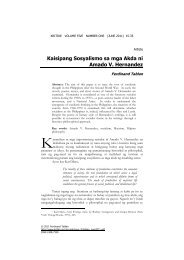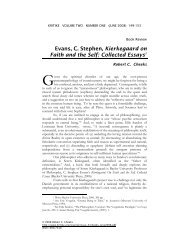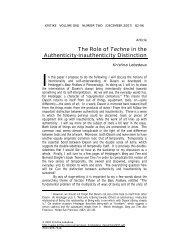The Paradox of Ipseity and Difference: Derrida's Deconstruction and ...
The Paradox of Ipseity and Difference: Derrida's Deconstruction and ...
The Paradox of Ipseity and Difference: Derrida's Deconstruction and ...
Create successful ePaper yourself
Turn your PDF publications into a flip-book with our unique Google optimized e-Paper software.
R. PADA 35<br />
inscription is efface or erased by writing as representation. What I am writing at<br />
this moment would, in its purity, be lost in the differences <strong>of</strong> the state <strong>of</strong><br />
consciousness in which an Other would read this, <strong>and</strong> even to myself, as my<br />
consciousness becomes altered through time, <strong>and</strong> thus lose my old self or my<br />
old state <strong>of</strong> consciousness.<br />
In this regard, one could say that I am writing in anticipation <strong>of</strong> my<br />
future disappearance, for in reading this once more, I have become an Other<br />
myself. Thus, in thinking <strong>of</strong> my future disappearance (which has always already<br />
occurred a while ago), I am under the effect <strong>of</strong> différance, for in this moment I<br />
am similar to what I would be in the future, <strong>and</strong> at the same time, be different<br />
from what I am right now. Derrida’s neologism, différance, 12 in itself, already<br />
demonstrates ipseity <strong>and</strong> at the same time difference. For in its inscription, on<br />
one h<strong>and</strong>, it intends to break away from its past, as Derrida states, from the<br />
phonocentric tendency <strong>of</strong> language: on the other h<strong>and</strong>, it still retains its similarity<br />
with the French word différence, retaining the remnants or the traces <strong>of</strong> the very<br />
same system that it tries to move away from.<br />
In what follows, I will attempt to explore the three key elements in the<br />
function <strong>of</strong> repetition, namely: center, consciousness, <strong>and</strong> difference. It is in this<br />
explication that I would base my contextualization <strong>of</strong> Derrida’s varying notions<br />
<strong>of</strong> logocentrism <strong>and</strong>, in turn, point out that within deconstruction,<br />
logocentrism becomes an imperative <strong>of</strong> its operation. My aim is to clarify what<br />
is implied in Derrida’s critique <strong>of</strong> logocentrism <strong>and</strong> to expose an apparent<br />
contradiction in his critique. This would serve as the foundation upon which<br />
we can discuss the possibility <strong>of</strong> an ontology that would best describe the<br />
operation <strong>of</strong> Derrida’s deconstruction.<br />
<strong>The</strong> Alterity <strong>of</strong> the I<br />
In Derrida’s reading <strong>of</strong> Husserl in Speech <strong>and</strong> Phenomena, Derrida tells us<br />
that the meaning <strong>of</strong> language lies in its telos, 13 the goal <strong>of</strong> which is to make<br />
something present in the consciousness <strong>of</strong> the other through expression <strong>and</strong><br />
sign (bedeuten und sinn). <strong>The</strong> problem lies, however, in the discrepancy between<br />
one consciousness <strong>and</strong> another, for despite the intention to signify <strong>and</strong> express<br />
something, language remains somewhat detached from the internal sphere <strong>of</strong><br />
indication from the ego. 14 <strong>The</strong>re is always an element in which meaning from<br />
expression <strong>and</strong> sign, differs from the original intention <strong>of</strong> a consciousness, for<br />
in so far as the text (or expression) aims at signifying, it already manifests the<br />
12 Différance differs from difference or the French “<strong>Difference</strong>” not only through its<br />
spelling but also with its intended meaning. It is the retention <strong>of</strong> both the structure <strong>and</strong> meaning<br />
<strong>of</strong> the word ‘difference’ <strong>and</strong> at the same time the effacement <strong>of</strong> its own meaning for différance<br />
st<strong>and</strong>s for the phenomenological <strong>and</strong> structural difference <strong>and</strong> ipseity <strong>of</strong> a subject’s inscription<br />
from that <strong>of</strong> the object <strong>of</strong> its miming or repetition. Jacques Derrida, Margins <strong>of</strong> Philosophy, trans.<br />
by A. Bass (Chicago: University <strong>of</strong> Chicago Press, 1982), 16.<br />
13 Jacques Derrida, Speech <strong>and</strong> Phenomena, trans. by D. Allison (Evanston Illinois:<br />
Northwestern University Press, 1973), 36.<br />
14 Ibid.
















